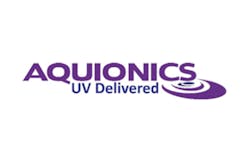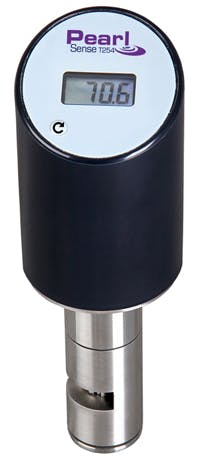Monitoring UV-T using the PearlSense T254 from Aquionics
Monitoring UV-Transmittance is an important part of UV system control. Having the most accurate indication of changes in water quality helps a water treatment facility operate a UV disinfection system at the optimum performance, and at the most efficient UV dose. The ability to take accurate measurements enables them to make changes on more than a weekly or monthly basis. Accurate measurements translate into better results. A new offering from Aquionics, the PearlSense T254, is designed to provide highly stable UV-T readings under all water conditions over an extended lifetime. PearlSense T254 is the world’s first, and smallest, UV-T monitor to incorporate a UV-C LED light-source in place of a conventional mercury lamp. The unique, patent-pending design utilizes a single lamp and sensor, eliminating drift seen in designs using multiple lamps and sensors.
The Handheld (H) unit provides a simple and portable field instrument for measuring the UV-T of various grab samples to validate system performance or to collect and record water quality data when sizing and designing a UV disinfection system. For example, a consultant could use a hand-held unit in the field to take individual samples directly at a customer site instead of sending the sample to a lab and waiting for test results. This saves valuable time during the early stages of designing a UV system. Having a UV-T reading available immediately on-site is also useful during the commissioning and validation of a new UV system. After the UV system is fully operational, some plant operators may prefer to have the technology on hand to take measurements of grab samples and use the UV-T test results as a basis for running their system. Given the simplicity of the handheld PearlSense T254, this process can be easily repeated weekly, daily or hourly depending on the needs of each location.
The PearlSense T254 is also available as a continuous UV-T monitor for installation directly into a treatment process. This version can be easily retrofitted to work with any UV system, by installing directly into a standard pipe connection or into an open channel environment. By using 4-20mA communication directly with the UV control panel, this model provides a plant with an indication of UV-T changes on a continuous basis. With the PearlSense T254’s ability to automatically clean the measurement area from any fouling, as well as providing a continuous calibration check, this process version of the PearlSense UV-T monitor is not only simple to implement for new and existing UV systems but the product is also very easy for operators to maintain.
Applications for continuous UV-T measurement are found in many municipal and industrial treatment environments. On the municipal side, UV disinfection can be found in both wastewater and drinking water treatment facilities, making UV-T measurement a useful parameter in both of these types of treatment plants. However, on the industrial side UV-T can complement the UV disinfection process in a much wider range of markets such as dairies, breweries, pools, water parks, electronics manufacturing, pharmaceutical processing, fish farming, ballast water treatment and any other industry where UV disinfection is used as the preferred disinfection process.
The PearlSense T254 is extremely easy to use, and the benefits of using a UV-LED light source for UV-T are immeasurable. Employing a single UV-LED to measure UV-T either continuously or in a handheld instrument, it simplifies the measurement process in a dramatic way. One significant benefit of using a UV- LED is that the instrument does not have to power the light source continuously to maintain accurate readings. When the UV-LED is powered on, it’s instantly on at full intensity. Therefore, the UV-LED is only required to be powered on when taking a measurement instead of running the light source continuously between readings which would lead to more frequent lamp replacements. Frequent lamp replacement is most common with other lamp technologies such as mercury or flash lamps. These conventional light sources also require a warm-up time and continuous operation in order to provide accurate and stable measurements, giving UV-LED light sources another unique advantage with their instant on/off functionality. Another benefit to using a UV-LED light source is the ability of the product itself to be much smaller and more compact than conventional instrumentation, such as by-pass style cabinets which take up much a larger footprint and may involve pumps, valves and supply/drain lines which can complicate the installation and operation of these types of devices.
With an extremely low operating cost, a much smaller physical footprint, combined with using a UV-LED light source to reduce the lamp replacement interval, it’s easy to see why the PearlSense T254 is the perfect solution for reliable UV-T monitoring.


